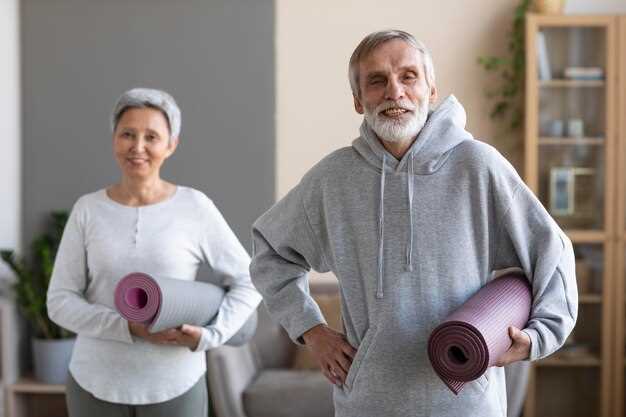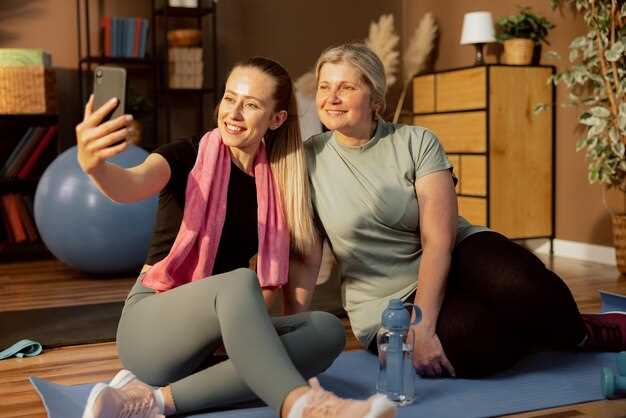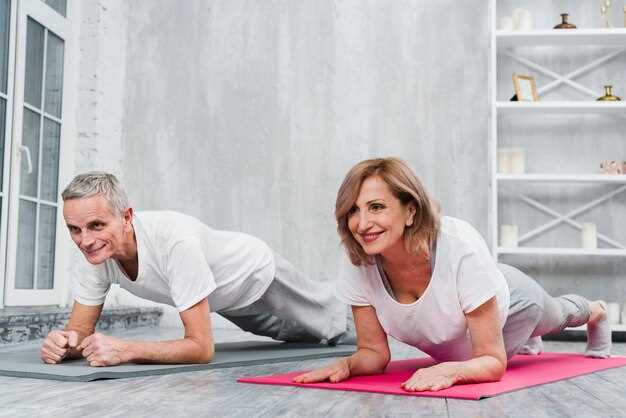Personal Trainer for Seniors in Home – Expert Guidance for Healthy Aging

In the quest for a vibrant and fulfilling life, the later years present unique challenges and opportunities. As we age, maintaining and enhancing our overall well-being becomes increasingly important. With this in mind, a tailored approach to fitness and health can make a world of difference.
Personalized training programs specifically designed for older adults have emerged as a valuable resource for those seeking to maintain an active and independent lifestyle. These programs, led by experienced professionals, offer expert guidance and support for individuals who are determined to age gracefully and on their own terms.
Discovering innovative ways to improve physical mobility, strengthen mental acuity, and nurture emotional resilience are cornerstones of this personalized training approach. By focusing on individuals’ unique needs and aspirations, trainers empower seniors to take charge of their own health and wellness.
Whether it’s regaining flexibility, building core strength, or simply increasing stamina and endurance, the benefits of working with a personal trainer for seniors are manifold. In the comfort and convenience of their own homes, individuals are able to participate in customized exercise regimens that are tailored to their specific abilities and goals.
Advantages of a Personal Fitness Instructor for Older Adults
As individuals age, prioritizing physical health becomes increasingly essential for maintaining overall well-being. Engaging in regular exercise and maintaining an active lifestyle can have numerous benefits for older adults. Older adults who work with a personal fitness instructor can experience a variety of advantages that contribute to their overall health and quality of life.
One major benefit of partnering with a personal fitness instructor is the personalized attention and guidance they provide. These knowledgeable professionals have expertise in designing tailored exercise programs that cater to the unique needs and abilities of older adults. By incorporating exercises that focus on strength, flexibility, balance, and cardiovascular health, a personal fitness instructor can help seniors improve their physical capabilities and reduce the risk of falls and injuries.
Additionally, a personal fitness instructor acts as a motivator and accountability partner for older adults. Regular sessions with a trainer can help seniors stay committed to their exercise routines, ensuring that they stay on track with their goals. The encouragement and support provided by a fitness instructor can also enhance seniors’ confidence and self-esteem in their physical abilities, leading to a greater sense of independence and satisfaction.
Working with a personal fitness instructor can also help older adults alleviate specific health concerns or conditions they may be facing. Fitness instructors are knowledgeable in adapting exercises and routines to accommodate various health issues such as arthritis, osteoporosis, or cardiovascular diseases. They can provide modified exercises and techniques that promote joint mobility, bone density, cardiovascular fitness, and overall functional capacity.
Furthermore, engaging in regular exercise under the guidance of a personal fitness instructor can contribute to mental and emotional well-being in older adults. Exercise has been proven to reduce stress, anxiety, and symptoms of depression. By incorporating exercises that stimulate the release of endorphins, fitness instructors can help seniors improve their mood, enhance cognitive function, and maintain a positive outlook on life.
In conclusion, hiring a personal fitness instructor for older adults offers a multitude of benefits that contribute to their overall health, well-being, and quality of life. The personalized attention, motivation, and expertise provided by these professionals can help seniors improve their physical capabilities, manage specific health concerns, and enhance their mental and emotional well-being. Investing in a personal fitness instructor is a valuable step towards achieving a healthier and more fulfilling aging process.
Improving Physical Strength and Mobility
The focus of this section is to enhance the physical abilities and movement capabilities of individuals in the senior age group, ensuring they maintain a high level of strength and mobility as they age gracefully.
Our aim is to assist seniors in increasing their physical strength and improving their overall mobility through targeted exercises and tailored training programs. By incorporating a variety of exercises that target different muscle groups, we can improve strength, balance, and flexibility, enabling seniors to enjoy an active and independent lifestyle.
Engaging in regular physical activity not only helps to maintain strong muscles and joints but also promotes cardiovascular health, improves posture, and reduces the risk of falls and injuries. As we age, it becomes crucial to focus on exercises that specifically address the common age-related physical changes, such as loss of muscle mass and bone density, joint stiffness, and reduced balance.
Our expert trainers will design personalized workout routines that suit the unique needs and abilities of each client. These routines may include resistance training to build muscle strength, joint flexibility exercises to enhance mobility, balance exercises to improve stability, and cardiovascular exercises to promote heart health and endurance. The trainers will also ensure proper form and technique, providing guidance and encouragement to maximize the benefits of each exercise.
By participating in our physical strength and mobility training programs, seniors can reap numerous benefits, including elevated energy levels, improved mood, increased independence, and enhanced social interactions. Our trainers will empower seniors to take charge of their physical well-being, enabling them to navigate daily activities with confidence and enjoy an active and vibrant lifestyle.
Reducing the Risk of Injuries and Falls

In the pursuit of maintaining a safe and active lifestyle, it is imperative for individuals in their golden years to take proactive measures to reduce the likelihood of injuries and falls. By implementing effective strategies and making necessary lifestyle adjustments, seniors can significantly minimize the risk of accidents, safeguard their independence, and ensure continued well-being.
One of the key aspects of injury prevention for seniors is creating a safe and supportive environment within their living space. This involves removing potential hazards such as loose carpets, cluttered walkways, and poorly lit areas. By ensuring proper lighting, removing tripping obstacles, and installing grab bars in critical areas, seniors can enhance their mobility and reduce the likelihood of unintended falls.
Regular physical exercise tailored to the specific needs of seniors can greatly contribute to reducing the risk of injuries and falls. Engaging in targeted strength and balance training exercises not only helps seniors develop better muscle tone and stability but also improves coordination and flexibility. By enhancing these physical aspects, seniors can enhance their overall well-being and reduce the possibility of accidents caused by weakness or instability.
| Top Tips to Reduce Injuries and Falls |
|---|
| Ensure proper lighting throughout the living space. |
| Remove tripping hazards such as loose rugs or cords. |
| Install grab bars near toilets, showers, and other critical areas. |
| Engage in regular strength and balance training exercises. |
| Wear supportive footwear with non-slip soles. |
| Stay hydrated to maintain good overall health. |
In addition to creating a safe environment and engaging in targeted exercise, it is essential for seniors to pay attention to their overall health. Regular check-ups with healthcare professionals can help identify any underlying medical conditions or medication side effects that may increase the risk of falls or injuries. Furthermore, seniors should prioritize proper nutrition and hydration to support their physical well-being and reduce the likelihood of accidents caused by weakness or fatigue.
By following these preventive measures and incorporating them into their daily routines, seniors can proactively reduce the risk of injuries and falls. This not only promotes their safety and independence but also allows them to lead fulfilling and active lives well into their golden years.
Tailored Exercise Programs to Meet Individual Needs
When it comes to maintaining a healthy and active lifestyle, it is important for individuals to have exercise programs that are specifically designed to meet their unique needs. In this section, we will explore the significance of tailored exercise programs and how they can contribute to overall wellbeing.
Personalized exercise programs take into consideration an individual’s age, physical abilities, and any pre-existing health conditions or concerns. By addressing these factors, a tailored program can cater to the specific needs and goals of seniors, ensuring that each exercise is safe, effective, and enjoyable.
One of the key benefits of a tailored exercise program is that it allows seniors to exercise at their own pace and comfort level. This personalized approach ensures that individuals are able to engage in activities that are not only suitable for their abilities but also promote optimal health and wellness.
In addition, tailored exercise programs can target specific areas of concern, such as improving balance and flexibility, increasing muscle strength, or managing chronic pain. By focusing on these areas, seniors can enhance their overall physical function and reduce the risk of injuries or falls.
Furthermore, a customized exercise program can provide individuals with a sense of empowerment and motivation. By working closely with a qualified professional who understands their unique needs, seniors can feel confident in their ability to take control of their health and actively participate in their own aging process.
In summary, tailored exercise programs play a vital role in promoting healthy aging among seniors. By addressing individual needs and goals, these programs offer personalized guidance and support to enhance overall wellbeing and quality of life.
Choosing the Perfect Fit: Finding the Ideal Fitness Expert for Mature Adults

When it comes to embarking on a wellness journey later in life, it’s crucial to partner with a knowledgeable professional who can guide and support you every step of the way. This article explores essential considerations for selecting the right fitness specialist to cater to the unique needs and goals of seniors.
1. Experience:
Look for a trainer who possesses extensive experience in working with mature adults. Their expertise should reflect in their ability to create specialized exercise programs, tailored to meet the needs of aging bodies. A seasoned professional with ample experience will understand the physical limitations and potential health risks associated with age and be adept at adjusting routines accordingly.
2. Qualifications:
Ensure that the trainer holds appropriate certifications and qualifications from reputable organizations. Look for qualifications such as Certified Personal Trainer (CPT), Senior Fitness Specialist (SFS), or equivalent designations that demonstrate their commitment to ongoing education and expertise in senior fitness.
3. Communication Skills:
Effective communication is key when working with a personal trainer. Seek someone who can clearly explain exercise techniques and provide instructions in a way that resonates with you. A trainer with excellent communication skills will also be able to listen attentively to your concerns, preferences, and any limitations you may have, ensuring a tailored approach to your fitness journey.
4. Empathy and Patience:
The ideal personal trainer for seniors should possess a compassionate and patient demeanor. Aging bodies may require more time and understanding to adapt to new routines. An empathetic trainer will be able to offer the necessary support and encouragement, creating a safe and nurturing environment for your fitness journey.
5. Goal Alignment:
Discuss your goals with potential trainers and gauge their understanding and commitment to helping you achieve them. A good match is one where the trainer demonstrates enthusiasm and expertise in assisting seniors with similar objectives to yours, whether it’s increasing mobility, improving balance, or enhancing overall strength and vitality.
Conclusion:
By considering these factors, you can confidently choose a personal trainer who possesses the right qualifications, experience, communication skills, empathy, and shares your fitness goals. Remember, finding the perfect fitness expert to guide your wellness journey is a crucial step towards healthy aging and a fulfilling life.
Experience and Proficiency in Working with the Older Population
With a wealth of knowledge and extensive hands-on involvement, our team possesses exceptional experience and expertise in catering to the unique fitness needs of older adults. Our trainers have honed their skills and have a profound understanding of the physical and mental aspects associated with the aging process. We are well-versed in tailoring exercise programs that prioritize safety, individual preferences, and specific goals, ensuring the promotion of optimal well-being.
In our pursuit of excellence, we have acquired significant proficiency in addressing the diverse challenges that may arise when working with older adults. Our trainers are adept at adapting exercises to accommodate any limitations or injuries that may be present, while still maintaining the effectiveness of the workout regimen. The emphasis is placed on promoting functional fitness, enhancing mobility, and improving overall strength and balance to enhance the quality of life for our clients.
Furthermore, our experience extends beyond the physical realm. We understand the importance of cultivating a supportive and encouraging environment for older adults, recognizing the significance of emotional well-being in achieving optimal health. Our trainers possess exceptional interpersonal skills, allowing them to establish strong connections with clients, provide motivation, and foster a sense of camaraderie and accomplishment.
By integrating our extensive experience and comprehensive knowledge of working with older adults, we are committed to providing individualized and tailored guidance that ensures a safe and enjoyable fitness journey. Our expertise sets us apart, enabling us to address the unique needs and concerns of each client, and ultimately empowering them to achieve healthy aging and an enhanced overall quality of life.
Understanding and Empathy for Age-related Obstacles
As we age, we often encounter a range of challenges that are specific to this stage of life. It is crucial for personal trainers working with seniors in their homes to have a deep understanding and sensitivity towards these age-related obstacles. By appreciating and acknowledging the unique difficulties faced by older adults, trainers can tailor their programs and support their clients in achieving healthy aging goals.
One key aspect of understanding age-related challenges is recognizing the physical changes that occur in the body with advanced age. These changes may include a decrease in muscle mass and bone density, reduced flexibility and mobility, and an increased risk of chronic conditions. By being aware of these physiological changes, trainers can design exercise routines that focus on maintaining and improving strength, balance, and joint mobility to enhance overall functional fitness.
Additionally, personal trainers should consider the cognitive and emotional aspects of aging when working with seniors. Mental acuity and memory may decline over time, and older adults may experience feelings of frustration or vulnerability as they navigate these changes. It is essential for trainers to provide a supportive and compassionate environment, fostering a sense of empowerment and motivation for their clients to stay engaged in their fitness routines.
Another significant challenge faced by older adults is managing chronic conditions and addressing the impact they have on physical activity. Trainers should be knowledgeable about common chronic health conditions such as arthritis, osteoporosis, diabetes, and cardiovascular disease. This understanding enables them to adapt exercises and incorporate modifications that are safe and effective for individuals with specific health issues, providing targeted support for their clients’ unique needs.
Lastly, effective communication and active listening are essential skills for trainers to develop when working with seniors. Older adults may have different communication styles and preferences, and it is crucial for trainers to adapt their approach to ensure effective understanding and guidance. By fostering open and respectful communication, trainers can build trust and create a comfortable environment where seniors feel heard and understood.
- Recognizing and addressing physical changes associated with aging
- Understanding cognitive and emotional aspects of aging
- Managing chronic conditions and adapting exercises accordingly
- Developing effective communication and active listening skills